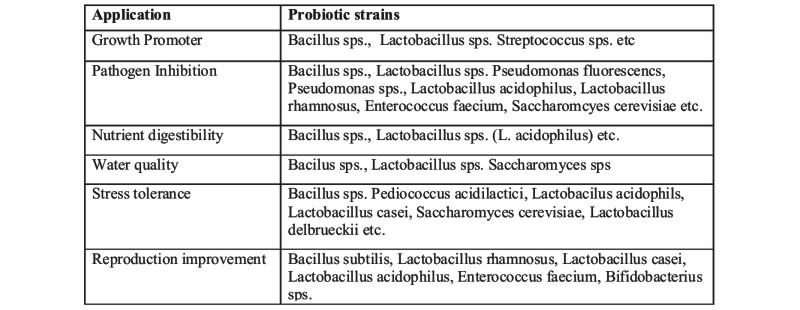Aquaculture is the world's fastest growing food production sector. However, Aqua culture is currently suffering from serious losses due to infectious diseases. Aquatic animals are exposed to stressful conditions, problems related to diseases and deterioration of environmental conditions often occur and result in serious economic loses. The use of antimicrobial drugs, pesticides and disinfectant in aquaculture disease prevention and growth promotion has led to the evolution of resistant strains of bacteria. Thus, the research into the use of probiotics for aquaculture is increasing with the demand for environment – friendly sustainable aquaculture. The benefits of such supplements include improved feed value, enzymatic contribution to digestion, inhibition of pathogenic microorganisms, anti-mutagenic and anti-carcinogenic activity, and increased immune response.
Probiotics are harmless bacteria that help the well being of the host animal and contribute, directly or indirectly to protect the host animal against harmful bacterial pathogens.
There are numerous strains of probiotic bacteria, each targeting different types of aquatic pathogens. In order for any of these probiotics to be fully effective, they must be in a live form, or able to be reactivated once in the GI tract of the host. Probiotics have been applied as dietary additives or water additives to improve growth performance and immune response, to improve water quality (by increased waste reduction), and to outcompete pathogenic bacteria.
Bioremediation of pond ecosystems is critical for sustainable aquaculture. Improved water quality has especially been associated with Bacillus sp. These bacteria are better converters of organic matter back to CO2. The use of these bacteria improves water quality, survival and growth rates and increases the health status Aqua cultures and reduces the pathogenic vibrios.
Mechanism of action of the Probiotic bacteria
- Probiotic bacteria competitively exclude the pathogenic bacteria or produce substances that inhibit the growth of the pathogenic bacteria.
- Provide essential nutrients to enhance the nutrition of the cultured animals.
- Provide digestive enzymes to enhance the digestion of the cultured animals.
- Probiotic bacteria directly uptake or decompose the organic matter or toxic material in the water improving the quality of the water.








